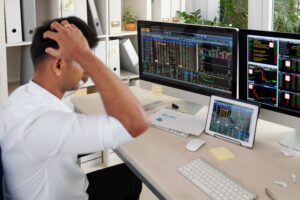FOMO in trading, also known as the fear of missing out, is one of the most disruptive emotional forces in the financial world. It pushes traders to abandon logic in favour of immediate action. During periods of high volatility or social media buzz, many traders experience intense pressure to act.
This fear doesn’t always come from within. Often, it starts when traders see others profiting. They panic, thinking they will lose out. So, they enter trades without proper planning. That single emotional action leads to inconsistent results. Over time, these small decisions cause major damage.
When fear of missing out in trading replaces discipline, traders start doubting their plans. Strategy becomes secondary. Emotion takes the lead. Every decision made under pressure pulls them further from consistency. FOMO distorts judgement and turns clarity into confusion.
This shift doesn’t happen overnight. It builds gradually as anxiety replaces confidence. The trader begins watching others instead of analysing markets. Their strategy becomes reactionary. Without a firm foundation, they start seeking fast results instead of long-term progress.
The longer this behaviour persists, the more difficult it becomes to recover. FOMO creates internal pressure that builds daily. Traders lose the ability to differentiate between a quality setup and a fear-driven one. They start measuring success by participation instead of profitability. This is where emotional trading begins to destroy strategic growth.
Over time, traders who operate under the influence of FOMO experience increased levels of stress. They become emotionally drained from chasing price action and missing key entries. Their thoughts shift from planning to reacting, and their systems become inconsistent.
Early Signs of Emotional Trading Mistakes
Traders facing emotional stress often overlook warning signs. These signs show up well before losses become visible. Common emotional trading mistakes include:
- Entering trades without analysis or confirmation.
- Ignoring stop-loss rules in hopes of a quick reversal.
- Chasing trades seen on social media without backtesting.
- Feeling pressure to stay in the market constantly.
- Hesitating on well-planned trades due to past regret.
- Taking larger positions based on envy or comparison.
These actions come from fear, not logic. Over time, the effects compound. Short-term wins might mislead the trader into thinking the behaviour works. However, the market eventually punishes those who trade without structure. Each loss driven by emotion lowers trust in oneself.
Mistakes driven by emotion also tend to be repetitive. A trader may not even realise they’re making the same error again. Reflection becomes essential. Without it, patterns remain hidden and behaviour unchanged.
Another important signal is hesitation after failure. Traders who lose due to emotional errors often freeze during future opportunities. This hesitation creates new losses from trades they never take.
Emotional trading mistakes can also result from over-optimism. A trader may assume they have figured out the market after a few wins. That illusion of control fades quickly when the market turns.
How Impulse Trading Behaviour Forms and Spreads
Impulse trading behaviour starts small. It often begins after one missed opportunity. The trader promises not to let another trade slip away. That mindset shifts focus from quality to quantity. They stop analysing and start reacting.
These traders feel they must always be active in the market. The fear of missing out makes them impatient. Instead of waiting for high-probability setups, they jump in at every movement. This increases exposure to risk and reduces profit potential.
Impulse trades lack planning. There is no entry validation, no exit strategy, and often no real reason behind the action. This pattern continues until the trader hits a streak of losses. By then, the damage is both mental and financial.
This behaviour also affects how traders view their results. They may obsess over recent trades rather than focusing on long-term performance. Losses feel heavier. Wins feel lucky. This imbalance affects their mindset.
To avoid impulse decisions, traders must pause and ask, “Does this setup meet my criteria?” If the answer is no, the trade should be avoided—no matter how tempting the opportunity appears.
As this behaviour spreads, it becomes difficult to separate intuition from fear. The desire to participate overrides judgement. Eventually, even non-trading days feel uncomfortable. This dependence on action limits growth.
Impulse trading can become addictive. The rush of entering trades provides temporary satisfaction. But that rush fades, and traders seek another quick entry to feel in control again.
The Impact of Psychological Triggers in Trading
Psychological triggers in trading cause rapid shifts in mindset. These triggers include regret, anxiety, envy, and ego. Each of them alters a trader’s decision-making process. The fear of missing out is one of the strongest among them.
External factors magnify these emotions. Social media posts showing profits can spark insecurity. News headlines create urgency. Trader forums may spread hype. All of these act as emotional triggers.
These triggers change behaviour. Traders who once followed a solid routine now rely on gut feelings. Regret from missing previous setups turns into overconfidence in the next trade. That cycle is dangerous.
Controlling these triggers is possible. Traders must step back and assess their thoughts. Before placing any trade, they should ask, “Am I acting on analysis or emotion?” That one question can prevent many mistakes.
Additional triggers like market rumours or economic predictions can also disrupt a trader’s process. Even watching a friend succeed in a trade you skipped can generate an emotional response. These experiences linger and shape future actions. Recognising and confronting them is key to sustained performance.
Other subtle triggers include overexposure to financial media, fear of underperformance, and past trauma from significant losses. All of these need attention.
Successful traders build emotional resilience. They practise self-awareness and mindfulness. They distance themselves from noise and focus on proven systems.
Long-Term Damage from FOMO in Trading
FOMO in trading does not only impact short-term results. Over time, it creates serious long-term damage. Traders lose trust in their process. They change strategies too often. Consistency disappears.
The emotional fatigue caused by constant action also reduces performance. Decision fatigue leads to missed setups. Overtrading leads to burnout. Instead of growing, the trader regresses.
More importantly, fear-based trading increases unnecessary risk. A trader may increase position size after a missed move. They may remove stop-losses altogether. These behaviours result in steep losses and long recovery periods.
Eventually, traders may start doubting whether they are fit for trading. But the issue isn’t ability. It’s emotional management. With structure and reflection, the damage can be reversed.
Losses triggered by emotional trades also take a toll on confidence. As drawdowns grow deeper, traders become hesitant. This hesitation stops them from taking well-aligned trades later. It becomes a cycle of missed chances followed by rushed entries.
Even when they find a system that works, the lack of trust built through FOMO behaviour prevents them from sticking with it. Over time, this weakens their ability to grow and scale.
These patterns create mental exhaustion. Doubts become louder. Every trade feels risky. Traders begin questioning their skills, even when setups are valid. They stop evolving and start reacting.
Long-term damage also includes loss of identity. Traders no longer see themselves as decision-makers. They feel like victims of the market.
Practical Ways to Control FOMO
To manage FOMO effectively, traders should mix strategy with self-awareness. Practical steps include:
- Use a trading checklist: Confirm every entry, exit, and risk level before execution.
- Maintain a trading journal: Record thoughts, setups, and emotional state.
- Limit screen time: Fewer charts mean fewer chances to overreact.
- Use time blocks: Only trade within specific windows to avoid impulse decisions.
Taking breaks also helps. Traders should walk away from the screen if they feel overwhelmed. Breathing exercises and short meditations can calm the mind. Reducing social media use limits exposure to triggering content.
Setting weekly goals can shift focus from daily trades to broader progress. For example, aim to follow all rules rather than hit a specific profit target. This builds discipline.
Lastly, reviewing trades weekly helps build awareness. By analysing emotional trades, patterns become clear. Once recognised, these patterns are easier to avoid.
Traders may also benefit from speaking with others. A trading coach or peer group offers accountability. External support encourages better discipline.
Using visualisation techniques can prepare the mind. Imagining the ideal trade process improves real-time decisions. This builds emotional strength before markets open.
Building morning routines and post-trade reviews helps sharpen focus. The best traders prepare mentally before trading begins. They also debrief after each session to learn from their actions.
Final Thoughts: Building Confidence Through Structure
FOMO in trading challenges every trader at some point. The key is not to eliminate fear—but to manage it. Structure, routine, and reflection are powerful tools.
Instead of chasing trades, focus on preparing for them. Let the market come to you. By doing this, you reduce emotional trading mistakes and regain control.
Understand that missed trades are not failures. The market offers unlimited opportunities. Patience ensures you’re ready when the right one appears.
To succeed, turn fear into focus. Replace impulse trading behaviour with a plan. Recognise psychological triggers in trading before they control your actions.
Stay calm. Stay consistent. And most importantly—trade with purpose, not pressure.
The more a trader practises structured habits, the stronger their mindset becomes. Over time, FOMO loses its grip. In its place, confidence grows. That confidence leads to better trades, sharper analysis, and long-term success.
True growth in trading begins with emotional mastery. Technical skills help you enter. Psychological strength helps you stay. Combining both gives traders their real edge.
Mastering FOMO takes time. But every step away from emotion and toward discipline is a step toward lasting profitability.
Read here to learn more about “Range Trading During Global Rate Shift: Safe or Risky in 2025?”

I’m Chaitali Sethi, a financial writer and market strategist focused on Forex trading, market behaviour, and trader psychology. I simplify complex market movements into clear, practical insights that help traders make better decisions and build a stronger trading mindset.

